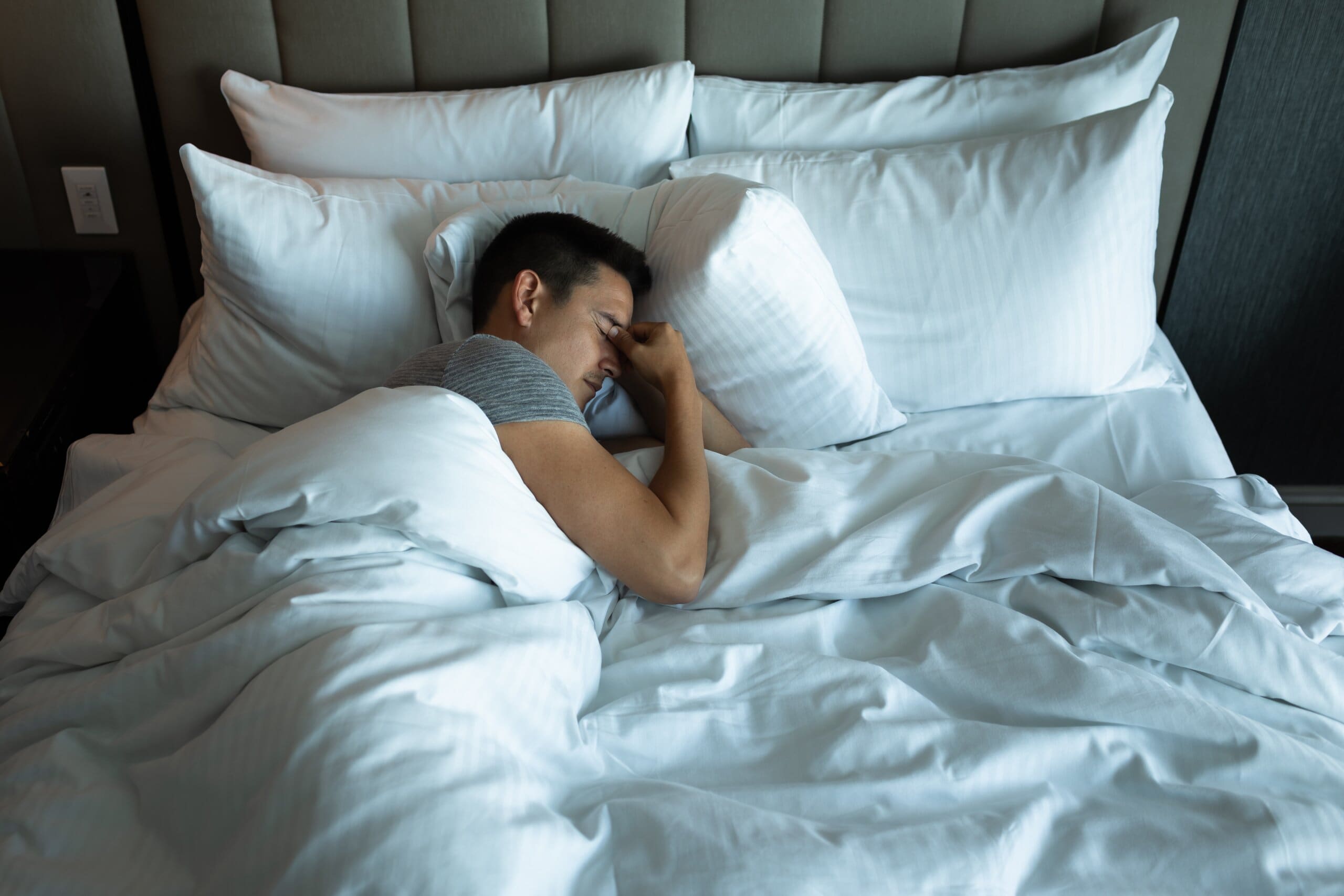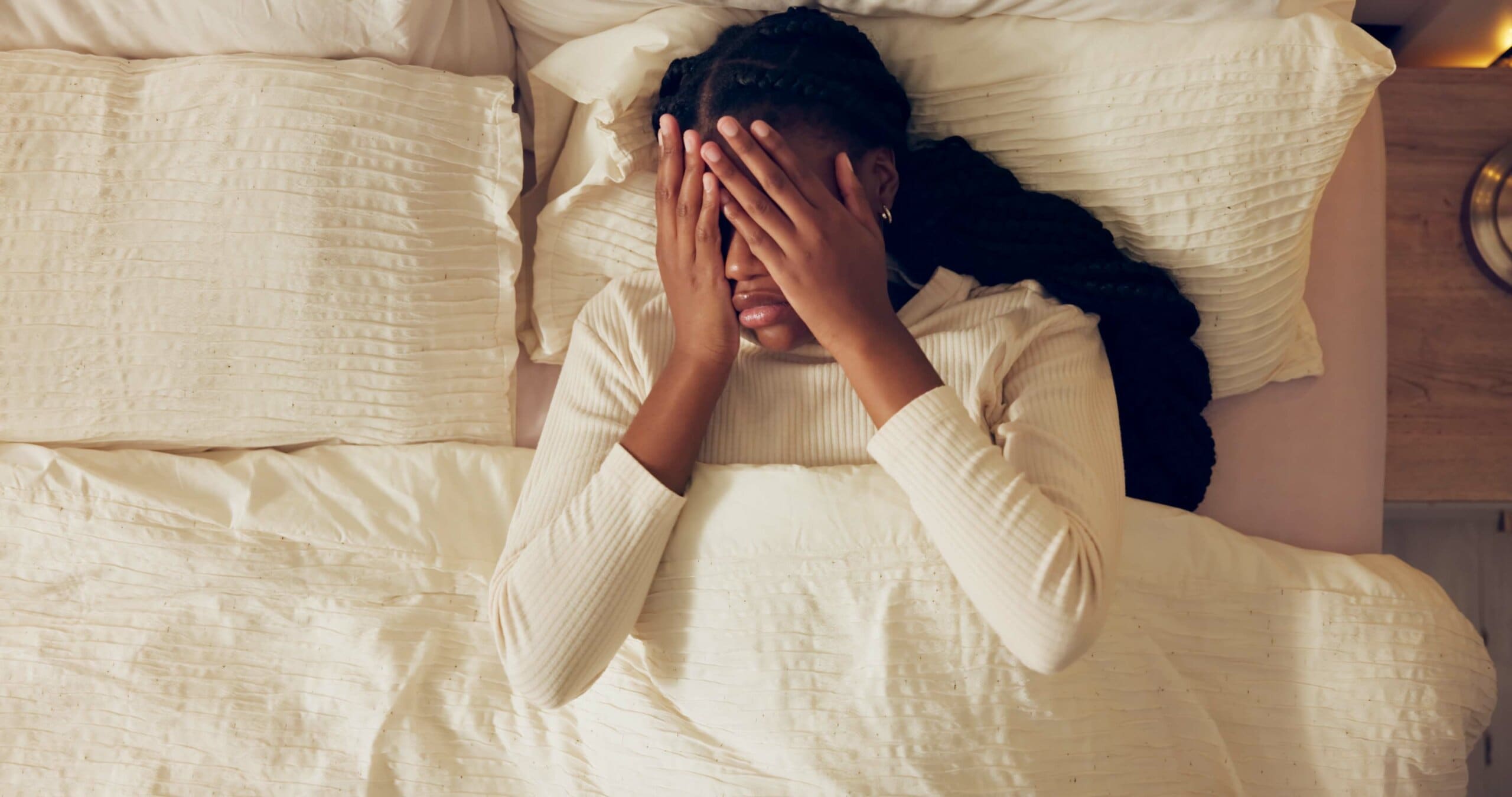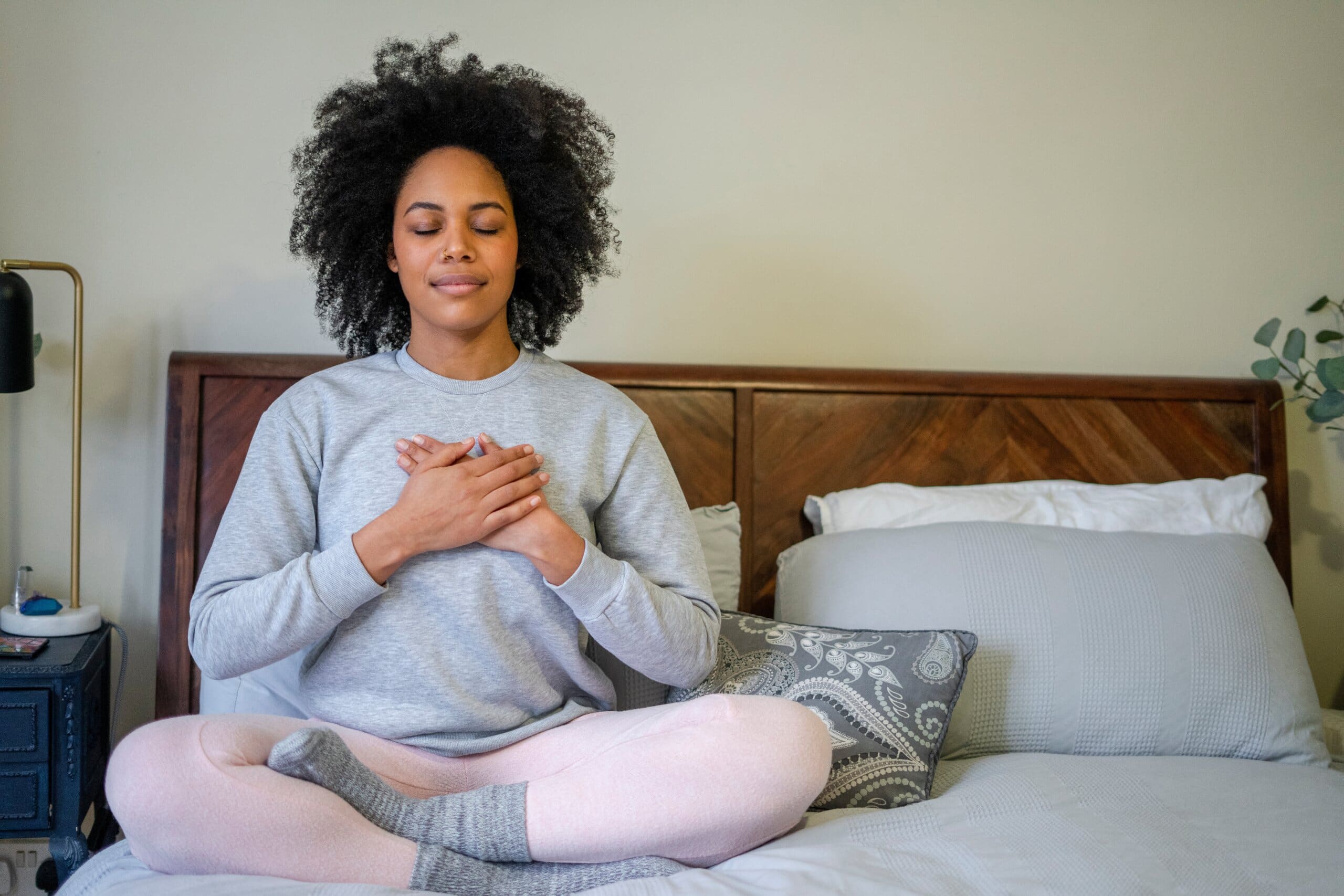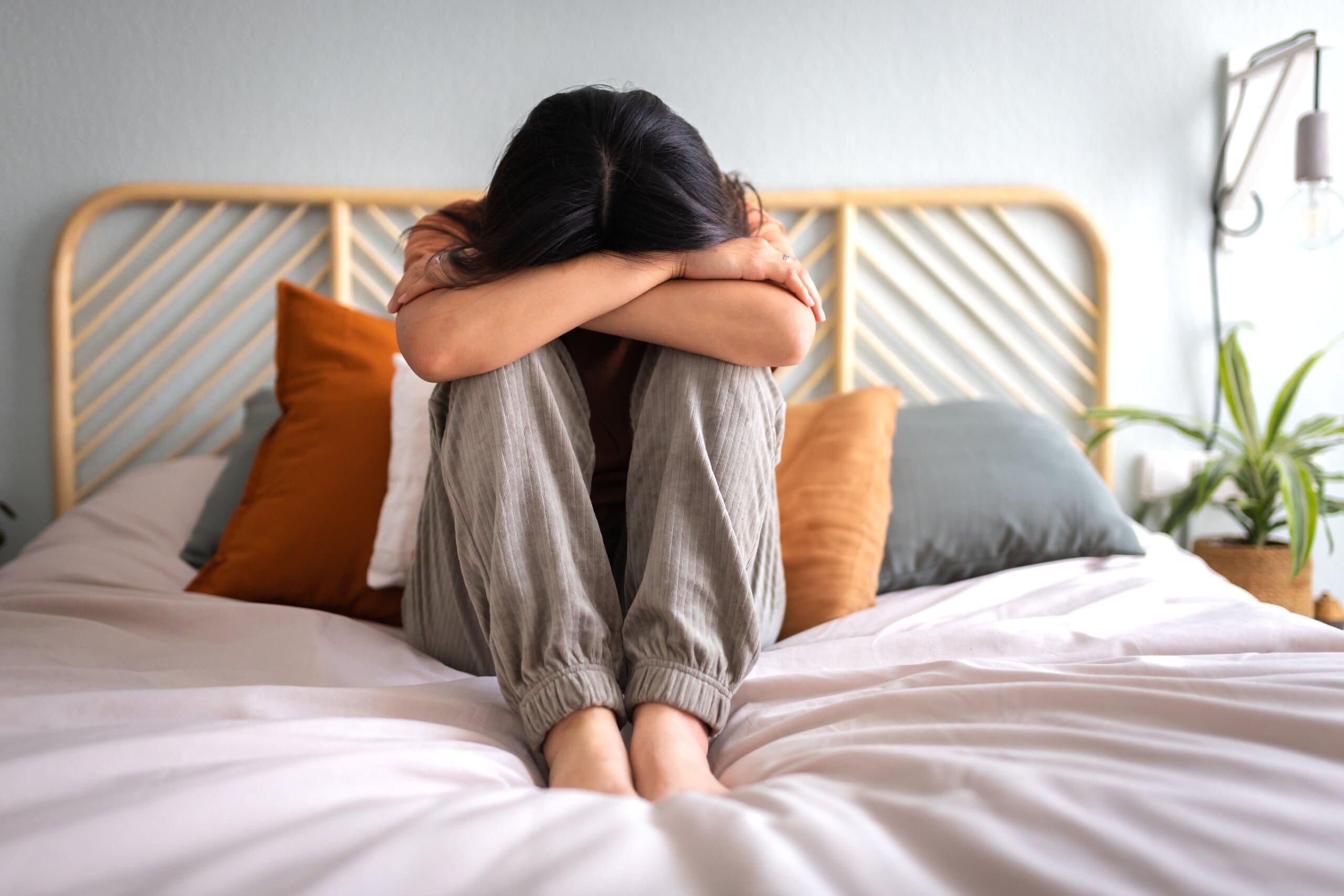Whether you’re in the midst of a stressful time at work, or you’re up late thinking about a big event the next day, we’ve all struggled to get to sleep from time to time, especially during the hectic parts of our lives. The answer to why you may be struggling to get to sleep is thanks to a chemical called Cortisol, also known as 'the stress hormone'.
Cortisol gets a bad rap in the health and wellness world, despite being an essential chemical for our bodies to function. And yet, there must be a reason for this poor reputation, right?
As you may expect, the relationship between cortisol and sleep is far more complicated than sleep bad, cortisol good. So, if you want to learn more about how sleep and cortisol are intertwined, and the impact of high cortisol levels on your sleep, check out our guide below for everything you need to know on this topic!

What is cortisol?
Widely referred to as the primary human stress hormone, cortisol is an essential chemical in your body that usually spikes in quantity when we’re exposed to (shockingly) stressful situations in order to make us more alert.
However, far from just being responsible for stressing us out, cortisol actually plays an important role in monitoring a variety of other major internal processes, including all of the following:
- Regulating immune response levels
- Regulating your metabolism
- Regulating your blood pressure
- Regulating your blood sugar levels
- Regulating inflammation
- Regulating energy levels
- Regulating your sleep-wake cycle
In other words, when we say cortisol is an essential hormone, we absolutely mean it!
Does cortisol affect sleep?
If you were paying attention to the last point on our list of what cortisol regulates, then you’ll almost certainly have noticed that cortisol is involved in coordinating our sleep-wake cycles, also known as our circadian rhythm. So, it’s an absolute given that your cortisol levels and the quality of your sleep go hand in hand.
Essentially, cortisol is responsible for heightening our energy and alertness levels, meaning that if cortisol levels are higher throughout the day and into the evening, you’re going to be that much more awake when you go to bed.
Of course, there is more going on between cortisol and sleep than this simple explanation implies.
How does cortisol affect sleep quality?
For those unfamiliar with how hormones play a role in our sleep-wake cycle, there are three key chemicals involved in the process that you need to be aware of:
- Cortisol
- Melatonin
- Adenosine
As we’ve already noted, cortisol helps to wake you up in the morning, meaning your body produces higher levels at the start of the day, which ideally decrease over the course of the day. And as your cortisol levels drop, your body will then start to gradually produce these other two hormones – melatonin and adenosine.
In contrast to cortisol, these two hormones basically dictate how tired you are. The higher their levels, the sleepier you become, with their levels increasing into the evening so that you’re tired come bedtime.
However, when cortisol levels remain high, it suppresses your body’s natural ability to produce melatonin and adenosine, meaning you stay awake for longer, and therefore find it harder to sleep – and even if you do sleep, such rest may be fragmented or of a restless quality that doesn’t involve in-depth periods of deep sleep and REM.
What causes high levels of cortisol?
With the knowledge that your sleep and cortisol levels might not always be aligned, you’re probably interested to know exactly what causes cortisol levels to spike outside of sleeping hours. And, well, the answer to this is pretty much anything that stresses us out!
From pressures around work and education to worrying about relationships and breaking news stories, if something causes you psychological stress, then it’s likely to increase cortisol levels as a byproduct of your body’s stress response.
Of course, there are also plenty of physical factors at play that can boost cortisol as well, such as avoiding regular exercise, maintaining a poor diet, and (ironically) not getting enough sleep.
All of this is to say that everyday life has the potential to stress us out and spike our cortisol levels if we let it.

What are the symptoms of high cortisol levels?
Given that things like lack of sleep and cortisol are linked, you’re probably wondering how you’ll be able to tell whether or not you’re experiencing higher levels of cortisol than normal. Especially once it starts to get later into the day.
Fortunately, there are plenty of signs that can indicate you’re body has higher levels of cortisol levels than required, such as:
- Irregular and unprompted mood swings
- Sudden anxious and depressive spells
- Poor sleep and insomnia
- Chronic colds
- A weaker immune response
- Rapid weight gain
- Mental fogginess
- Increased levels of sleep apnoea
- Increased heart rate
- Rapid breathing
- Heightened states of alertness
Naturally, none of these on their own necessarily mean you have boosted levels of cortisol, but if you experience one or more of these together for a prolonged period, you should speak with your doctor about testing your cortisol levels.
What to do when you can’t sleep from stress and high levels of cortisol
So, seeing as cortisol and stress are practically one and the same when it comes to keeping you awake on those late nights, what can you do to lower your cortisol levels and improve your sleep quality?
We’ve shared our best pieces of advice on what to do when you can’t sleep from stress, below:
- Establish good sleep hygiene – first and foremost, even if you suffer from regular bouts of insomnia, it’s important to establish and stick to a sleep routine. This means getting up and going to bed at the same time every day (even on weekends) to reset your circadian rhythm, avoiding screens at least an hour before bed to prevent overstimulation, and making your bedroom sleep-friendly for a comfortable night’s rest. That way, you can encourage your body to slowly return to a regular sleep pattern over time.
- Get regular exercise – besides helping your body to stay healthy, engaging in regular exercise has been proven to lower the cortisol levels in your body, which in turn allows for increased production of melatonin and adenosine as the day goes on.
- Improve your diet – similarly to regular exercise, a healthy diet that avoids excessive junk foods can also help reduce cortisol spikes, as well as any stressors that may be related to diet and weight.
- Practice mindful activities – it might sound a little odd if you’re not into them, but practices like meditation and yoga have continually been shown to have calming and centering effects on our minds, lowering cortisol levels through their de-stressing processes and activities. Meditating in bed can be an excellent way of lowering cortisol and helping you drift off.
- Minimise your caffeine and alcohol intake – even if you don’t suffer from insomnia or high levels of stress, reducing your caffeine and alcohol intake is a surefire way to improve the quality of your sleep. And even if you are feeling stressed, you should avoid these substances to prevent your sleep from being disrupted any more than it already is.
- Make space for personal time – in the same way that mindful activities can have a calming impact on our psyche, making time to do the things you love is another great way to lower stress levels. Whether this is picking up a hobby or spending more time with friends and family, making personal time for yourself is one of the best ways to combat high-stress levels.
- Eliminate stressors when possible – although not possible for all areas of stress, if things like a dirty house or unfinished chores are adding to your stress levels, taking the time to complete all these can go a long way to dealing with any cumulative stress you might be experiencing, which can lead to sleep anxiety.

Upgrade your bedroom with a new mattress
Hopefully, you should now have a much better idea of how cortisol and sleep are linked, as well as some actionable advice you can try to help lower your cortisol levels if you’re feeling stressed. Consistently high levels of cortisol, as you can imagine, can lead to increased anxiety and depression, and with the link between mental health and sleep being so close, it's important to understand these aspects of your lifestyle.
Of course, if you feel like your sleeping arrangement is in need of an update, then why not take a look at the MattressNextDay range today? From traditional mattresses to king-sized bed frames, we’ve something for everyone in our collection.
And if you’re interested in more insights into sleep and buying the right furniture for your bedroom, don’t forget to visit our Snooze News sleep blog and Buying Guides for more handy pieces like this one!





